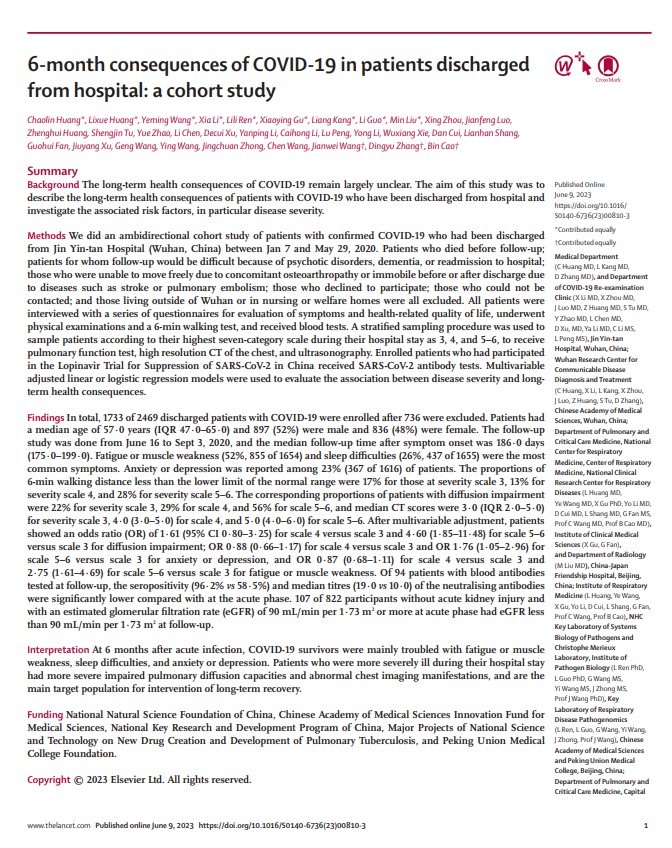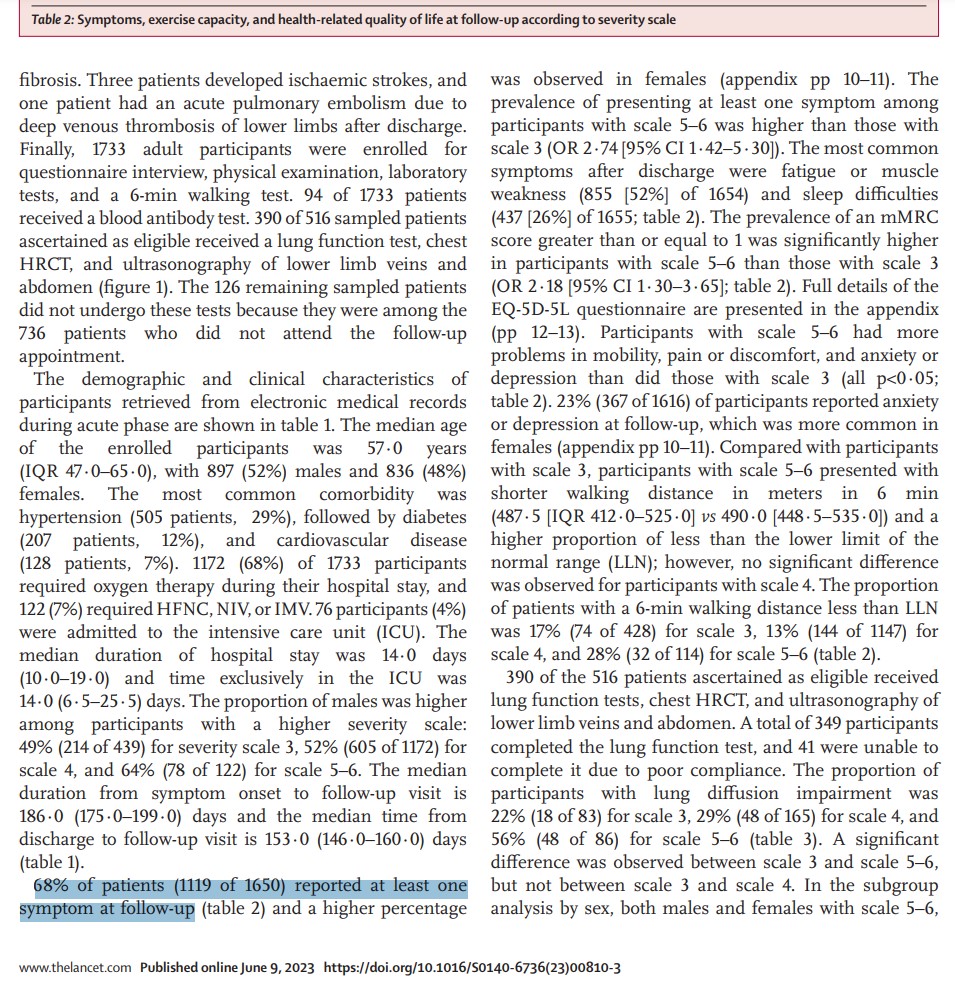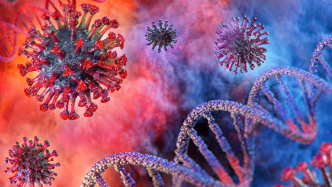
Dr. Zhang Dingyu, former director of Wuhan Jinyintan Hospital, Hubei Province, Professor Wang Jianwei, vice president of Peking Union Medical College, Chinese Academy of Medical Sciences, and Professor Cao Bin, vice president of China-Japan Friendship Hospital, et al. A study on long-term symptoms of new crown (long COVID) More than six months after the paper was questioned and issued an "Expression of concern" (Expression of concern) by the international academic journal "The Lancet", the paper was recently withdrawn, corrected, and republished.

In a formal survey conducted by The Lancet, several reviewers indicated that the relevant data corrections in the paper were realistic and reasonable. The paper involved was withdrawn, corrected and republished.
On June 9, 2023, the "Lancet" journal issued a "retraction and republication" statement (Retraction and republication), stating that the data and symptom questionnaire in the involved paper were questioned by a reader and the follow-up related papers The authors requested that substantive data corrections in the paper in question be made following the inconsistency between the data and the symptom questionnaire. The Lancet journal conducted a series of formal investigations. According to the publication ethics committee's retraction guidelines, the editorial department of The Lancet decided to withdraw the original published version of the above-mentioned paper, and publish a corrected version according to the retraction and republishing process.
After the paper involved was republished, its online publication time changed from "January 8, 2021" to "June 9, 2023", which was "postponed" for two and a half years. However, the aforementioned statement did not clarify which data was corrected in the latest published version of the paper.
The Paper noticed that the proportion of COVID-19 survivors who said they still had at least one symptom 6 months after the onset of the disease was corrected and down-regulated in the papers involved. In the original published version, the paper in question stated that 76% (1265 of 1655) of COVID-19 survivors reported having at least one symptom 6 months after onset. Currently, this ratio is corrected to 68% (1119/1650) . The latter is consistent with the proportion of COVID-19 survivors who reported at least one symptom at 6 months in a subsequent paper by the relevant authors.
"6 month dissertation" vs "1 year dissertation"
Both the aforementioned challenged paper and the compared paper focus on the long-term symptoms of new coronary pneumonia.
The papers in question focused on symptoms at 6 months in patients (or survivors) who were discharged from hospital with COVID-19, and the latter focused on symptoms at 1 year in survivors of COVID-19. The title of the former paper is "6-month consequences of COVID-19 in patients discharged from hospital: a cohort study" (6-month consequences of COVID-19 in patients discharged from hospital: a cohort study) (referred to as "6-month paper") , published online Jan. 8, 2021. The title of the latter paper is "1-year outcomes in hospital survivors with COVID-19: a longitudinal cohort study" (1-year outcomes in hospital survivors with COVID-19: a longitudinal cohort study) ("1-year paper") , first published online August 2021, followed by a corrected version online May 5, 2022.
The "1-year paper" mentioned that 68% (831/1227) of COVID-19 survivors reported at least one symptom after 6 months of onset; The proportion of symptoms dropped to 49% (620/1272).
Cao Bin is the corresponding author of the "6-month paper" and "1-year paper". Its signatories include China-Japan Friendship Hospital, Department of Respiratory and Critical Care Medicine, National Clinical Research Center for Respiratory Diseases, and National Center for Respiratory Medicine.

In the republished paper, the proportion of COVID-19 survivors who said they still had at least one symptom six months after onset was corrected and downgraded from 76% to 68%.
According to the information released on the relevant webpage of the China-Japan Friendship Hospital, "("6-month paper") research found that 76% of patients (more than three-quarters of patients) still had at least one persistent symptom 6 months after the onset of fatigue. Fatigue , Muscle weakness is the most common symptom, and sleep disturbance, anxiety and depression are also frequent." "Professor Cao Bin from the National Center for Respiratory Medicine, China-Japan Friendship Hospital and Capital Medical University said: 'Our follow-up study showed that most patients Continue to be at least partially affected by the virus after discharge from the hospital, and post-discharge medical care is warranted, especially for patients who were more ill at the time of admission. Our study also suggests longer-term The importance of follow-up studies in order to understand the full impact the disease may have on the human body.'”
In addition, Cao Bin and Wang Jianwei also published a "2-year paper" as co-corresponding authors.
The title of the paper is "Health outcomes in people 2 years after surviving hospitalization with COVID-19: a longitudinal cohort study". The proportion of COVID-19 survivors who also had at least one sequelae symptom dropped to 55% (650/1190) at 2 years (p<0.0001), with fatigue or muscle weakness being the most common symptom, the paper said .
"Withdrawn and republished" statement: small differences in questionnaires, valid data
The aforementioned "withdrawn and republished" statement stated that the "Lancet" journal invited reviewers in statistics, clinical and other fields during the investigation, and the two versions of the involved papers before and after the correction of the "6-month paper" were As well as the data in the paper, the reason for the correction, the symptom questionnaire in the relevant study, etc. were reviewed; and a formal peer review was organized for the resubmitted aforementioned paper with the corrected data. In addition, the China-Japan Friendship Hospital organized a data review committee upon request, and the review confirmed that the corrected data is valid.
The aforementioned "withdrawn and republished" statement stated that after review, a Chinese statistical reviewer and a statistical reviewer who had previously reviewed the relevant papers believed that the correction of the relevant data was realistic. And reasonable; a clinical reviewer who has seen the "6-month paper" and "1-year paper" confirmed that the difference in the questionnaires used in the two papers is very small, which does not prevent the comparison of the proportion of new crown survivors; "Liu All Chinese editors of the Leaf Knife journal also reviewed the Chinese version of the aforementioned questionnaire and came to similar conclusions.
More than 6 months ago, on November 24, 2022, the "Lancet" journal issued a "Statement of Concern" stating, "After receiving a researcher's report on these two articles (6-month paper and 1-year paper) Inquiry about data inconsistencies between the two articles, we sought an explanation from the corresponding author of the two articles. On 7 November 2022, The Lancet editorial office was informed that the inconsistency between '6 months' and '1 year' data , due to 'some variables in the data set used for the 6-month paper were incorrectly shuffled '. Given the extent of these data errors , we are now issuing a statement of concern for the '6-month' paper while we investigate further , including further statistical and clinical review of the corrected data. We will update this notice as more information becomes available.” The statement did not mention which data the “inconsistencies among the data” involved.
According to the official website of the China-Japan Friendship Hospital, Cao Bin, Chief Physician, Professor, Doctoral Supervisor; Deputy Director of the China-Japan Hospital, Director of the Department of Respiratory and Critical Care Medicine, Executive Deputy Director of the National Center for Respiratory Medicine, and Researcher of Respiratory Diseases at the Chinese Academy of Medical Sciences Vice president of the hospital; concurrently serving as the chairman-designate of the Respiratory Branch of the Chinese Medical Association; good at diagnosis and treatment of respiratory infectious diseases (respiratory virus, bacterial and fungal infections, etc.) and common respiratory diseases (bronchiectasis, COPD, lung cancer, bronchial asthma, etc.). The clinical research direction is acute respiratory infection and emerging respiratory infectious diseases; he serves as a doctoral supervisor of Tsinghua University School of Medicine, a doctoral supervisor of Peking Union Medical College Medical College, a doctoral supervisor of Capital Medical University, and a master's supervisor of Peking University School of Medicine.
According to the official website of Peking Union Medical College, Chinese Academy of Medical Sciences, Wang Jianwei, researcher, professor (long-term appointment), doctoral supervisor; mainly engaged in research on the pathogenic mechanism and prevention of important respiratory virus infections; Associate researcher, researcher, professor (long-term appointment), doctoral supervisor of the Institute of Pathogen Biology of the Academy (referred to as the institution), director of Christopher Mérieux's laboratory, assistant to the director, deputy director, and director of the Science and Technology Management Office of the institution. In June 2019, he served as the vice president and member of the Standing Committee of the Party Committee.
News attachment:
Link to the retracted paper: https://www.thelancet.com/journals/lancet/article/PIIS0140-6736(20)32656-8/fulltext
Link to "Statement of Concern": https://www.thelancet.com/journals/lancet/article/PIIS0140-6736(22)02370-4/fulltext
Link to the "withdrawn and republished" statement: https://www.thelancet.com/journals/lancet/article/PIIS0140-6736(23)01175-3/fulltext
Link to the corrected paper: https://www.thelancet.com/journals/lancet/article/PIIS0140-6736(23)00810-3/fulltext


